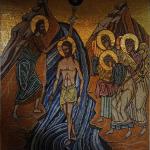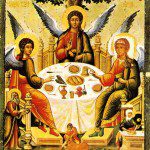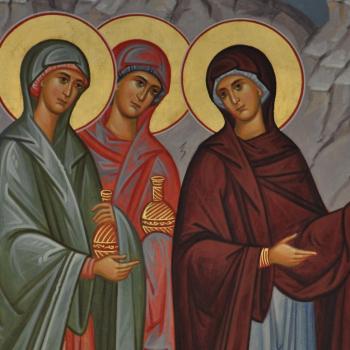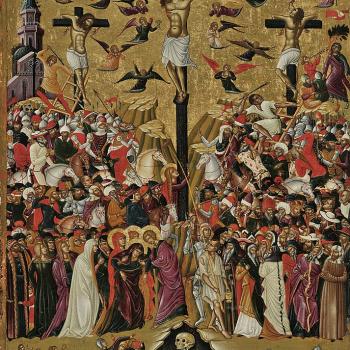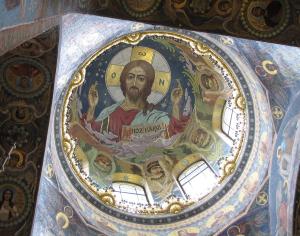
The mystical body of Christ, the church of Christ, subsists in the institutional Catholic church. This means that the Catholic church continues to bring and reveal the presence of Christ to the world. Yet it also means that Christ’s presence does not have to be seem as limited to the institutional church, that it can, at least in theory, subsist in other institutions or groups of people. This reality is something which is difficult to grasp, and for that reason, it has taken time for Christians to realize it. Indeed, we are still learning as to what this means, not only in an ecumenical setting, but in an inter-religious setting as well. We know that the church is one, and so finding it capable of subsisting in a diverse number of ways would make it seem to deny that unity – that is, until we consider how each particular, local church community demonstrates the truth of this, as the diversity of communities (parishes) does not undermine the unity and oneness of the church.
It is easy to believe that some historical institution, such as the Catholic church, is univocal with the church of Christ. And, to be sure, we find this was what so many Christians have done throughout the centuries as they argued with each other as to determine which institutional reality is the true body of Christ. If there was one institutional reality which demonstrated perfect holiness, where all its leaders and members were clearly saints, it would be easy to suggest where this institution is to be found, confirming the univocal relationship between the church of Christ and the institution which represents it. However, due to the complex history of Christianity, and bad members and leaders found within any historical ecclesiastical communion, many Christians have come to find it is difficult to believe any institution truly presents the church. They realize the historical reality is far different from its ideal. For this reason, some end up believing that the church, if it exists, is to be found outside of the world, and will only be experienced in the eschaton, outside of time and space. They might suggest that any historical institution, at its best, only points to and directs us towards that eschatological reality. This should leave us wondering what Christ meant when he said that he will be with us to the end of the world, if he and his historical presence is no longer with us in any institutional form. It is here that the theology coming from Vatican II, where the church of Christ is said to subsist in the Catholic church, helps us come to a different answer, one which understands the logical distinction which needs to be made between the church of Christ and any institution which claims to represent it. When such an institution is shown to open itself up and participate in the reality of the church of Christ, then the church of Christ can be said to subsist in it, and in this way, the church of Christ is made present in history. It can and will be found in the midst of all kinds of trials and tribulations. It can even surrounded by all kinds of bad players who otherwise make it difficult to discern or experience. Nonetheless, it also means the church of Christ is not limited to any particular institutional manifestation. If it subsists in an institution, than the institution has fullness of the presence of the church, so that they church is truly encountered in it. It can be said to be like communion: every eucharistic reception gives the fullness of Christ to the one who partakes of it, even if each reception comes to the person through different accidents, and so, the church of Christ can and does manifest itself in and through different historical contexts (accidents).
There was always an intuition, buried deep within tradition, that recognized that the church was something more than its historical institution. This has led many theologians to talk about the church’s existence in such a way that it was seen to exist before its institutional beginning. For example, many talk about the church and its presence in pre-Christian times (for example, as the “church of Israel). Similarly, as Christians found the world itself to be bigger than they expected, that is, with the discovery of the so-called “New World,” they had to come to terms with the way those who had no way to hear the Gospel could still receive grace and somehow be connected with the church. This led them to explore further the way God worked with sacraments, where it was clear, the grace of the sacraments could be distinguished from the liturgical celebration of the sacraments so that some could receive that grace of the sacraments apart from their liturgical celebration (while recognizing the authentic engagement of those liturgical celebrations will always include such grace). And when they recognized this, then the grace found in baptism, which connects people to Christ and so to the church of Christ, could be something those in the New World already experienced.
The historical, institutional manifestation of the church of Christ, which cannot be disconnected from that church, but always, in some fashion, participates in it, making it a historical reality, has been given gifts which it was meant to use and share with the world. These gifts are to help everyone grow in grace, so that through them, everyone could find their proper place in union with Christ. Those gifts include leadership roles for the institutional church so that the church would not exist merely as some sort of Gnostic entity apart from the world, but rather, would exist in the world with the structure it needs in order to preserve its presence in the world, and with it, keep the memory of Jesus and his teachings alive throughout history. Thus, the institutional church’s gifts are twofold, one, to provide the grace needed for the transformation of those within its domain, but second, to provide the grace needed to keep the church continuing throughout history, despite the failures of its members, so that the Gospel can be made alive for every generation. They are not meant to prop up the institutional church in a way that leads us to ignore its failings, and therefore, its need for constant reform. All of the gifts given to the institutional church point to Christ and the union we are to have with one another and with Christ (in the church of Christ). The institutional church can, and has, done all kinds of grave evils, but thanks to the gifts given to it, those evils, though they hamper its work, though they can lead people to look elsewhere for grace, cannot entirely prevent Christ from sharing grace through the institutional church. The institution continues, often despite itself, and so it continues to share grace to the world and preserve the message of Christ. Its continuing historical presence guarantees the continued remembrance of Christ in history.
Thus, Paul made it clear that the institutional church, and its gifts, including the charisms given to people within it to have leadership roles in the church, works not for itself but for our salvation and our union with Christ:
But grace was given to each of us according to the measure of Christ’s gift. Therefore it is said, “When he ascended on high he led a host of captives, and he gave gifts to men.” (In saying, “He ascended,” what does it mean but that he had also descended into the lower parts of the earth? He who descended is he who also ascended far above all the heavens, that he might fill all things.) And his gifts were that some should be apostles, some prophets, some evangelists, some pastors and teachers, to equip the saints for the work of ministry, for building up the body of Christ, until we all attain to the unity of the faith and of the knowledge of the Son of God, to mature manhood, to the measure of the stature of the fulness of Christ (Eph. 4:7-13 RSV).
Of course, as the presence of Christ is found in the world in and through the institutional church. though, not limited to it, just as Christ does not limit our reception of grace to the sacramental rituals, we must understand that the presence of Christ gives out a light which shines in the darkness, a light which resists the darkness of sin wherever it is found. Indeed, sometimes the greatest truths of the Gospel are revealed in the midst of the conflict between the darkness of sin and the light of grace, where the darkness is confronted by the light, and instead of overcoming the light, finds the light spreads into the darkness to transform what is in the darkness, making it a part of the light. The light of grace does not destroy, like the darkness of sin; rather, it takes what it finds, using the good which it finds in it, and uses that as the foundation for making it something far better than it ever was, even before the darkness of sin hurt it. Of course, the light will also reveal what is in the darkness: nothing will remain hidden. Historically, this is exactly what we see happed throughout Jesus’ earthly ministry. He brought things to the light, but he did so, not to judge or condemn, but to bring healing grace. And this is why it seems that he truly begun his public ministry when the darkness achieved a new victory as it had John the Baptist was imprisoned:
Now when he heard that John had been arrested, he withdrew into Galilee; and leaving Nazareth he went and dwelt in Capernaum by the sea, in the territory of Zebulun and Naphtali, 14 that what was spoken by the prophet Isaiah might be fulfilled:
“The land of Zebulun and the land of Naphtali, toward the sea, across the Jordan, Galilee of the Gentiles — the people who sat in darkness have seen a great light, and for those who sat in the region and shadow of death light has dawned.”
From that time Jesus began to preach, saying, “Repent, for the kingdom of heaven is at hand” (Matt. 4:12-17 RSV).
When Jesus began his public ministry, he started with and continued with the message which was given by John. But he came to do so much more. He came to give the grace which was needed for spiritual transformation. He did more than expose what was in the darkness, he provided the means by which those who were engulfed in darkness could and would find themselves joining themselves with the uncreated light of grace. Everyone is called to unite themselves with the uncreated light of God. Thus, the mission of John was only a starting point. The darkness had to be exposed. But more than that, healing had to come to the world, healing which would allow those who were once engulfed in darkness to find their way beyond it, to see the good which they already had and use that as the means by which they could join themselves to the light, becoming a part of the church of Christ. And so in his death and resurrection, Jesus proved victorious against the darkness and sin, a victory which he now he uses to transform the whole world and make it one with him, a truth which is revealed in and through the institutional church as the church of Christ subsists in it.
Stay in touch! Like A Little Bit of Nothing on Facebook.
If you liked what you read, please consider sharing it with your friends and family!
N.B.: While I read comments to moderate them, I rarely respond to them. If I don’t respond to your comment directly, don’t assume I am unthankful for it. I appreciate it. But I want readers to feel free to ask questions, and hopefully, dialogue with each other. I have shared what I wanted to say, though some responses will get a brief reply by me, or, if I find it interesting and something I can engage fully, as the foundation for another post. I have had many posts inspired or improved upon thanks to my readers.


